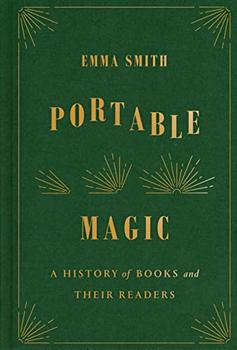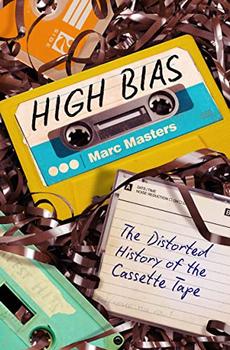Summary | Excerpt | Reviews | Beyond the book | Read-Alikes | Genres & Themes | Author Bio

A History of Books and Their Readers
by Emma SmithPortable Magic begins with an alluring narration of the fairy tale "The Master and His Pupil," a story featuring a book with the power to summon demons. Pointing out that "It's the book that summons the demons, not its clumsy reader," author Emma Smith lays out her central argument: "the book itself, as much as its contents,…has agency."
Maintaining a razor-sharp focus on the materiality of the book — more precisely, the "undersung inseparability of book form and book content," which she terms "bookhood" — Smith explores familiar as well as new topics and themes. She brings scholarly vigor to issues around the reading, publication and usage of books and sets them in geographical, temporal and historical contexts. All this is done with a conversational levity that is both beguiling and surprising: I did not expect to be laughing out loud at this book.
Each of the 16 chapters is complete in itself, with its own idea, argument and structural integrity. Smith situates each main idea in a bookish anecdote, then brings in interesting twists and turns of events with journalistic flair. In the chapter "Christmas, gift books and abolition," she charts out the particular journey of the Christmas book in Europe from banal gift to a means of disseminating pro-abolitionist content. In another chapter, she narrates the familiar story of Gutenberg's printing press endeavor with awe and wonder, reverentially but also entertainingly. You can almost imagine her speaking to a hushed and rapt audience.
Portable Magic covers a wide range of topics, though some among these have been overdone by others. To Smith's credit, even when the book-related subject is familiar to the point of triteness, such as the question of what makes a classic, she still either presents an entirely fresh perspective on it, or includes a thoughtful and insightful aspect that might make you think of it in a different way altogether. While writing about the phenomenon of the Nazi book burnings in the chapter "May 10, 1933: burning books," Smith steers towards the inherent reproducibility and replaceability of books, and thereby the impossibility of "burning" them away. Then she frames the issue in a more practical, realistic sense: It is the fate of most books to be "destroyed" — that is, pulped. With modern printing and the foreverness of the internet, books can't really be done away with, which seems to be the ideological pursuit of those that advocate burning supposedly offensive books, even today. If books are gotten rid of, it is usually for reasons far more mundane, like it no longer being profitable for the publisher to keep them in print.
Portable Magic is quite Eurocentric, and as an Indian, I found parts of it tedious and dry to read, such as the details about the Christmas gift book tradition, or how the Armed Services Editions — paperback books distributed to American troops during World War II — played a part in winning the war, although I can't blame the writer for this. In addition, certain anecdotes and chapter hooks are rather complicated to follow.
Nevertheless, most of Smith's ideas and themes make for moving stories. Portable Magic sets books and bookish people in significant historical contexts, plucking them out of dusty offices and gloomy library rooms and reclusive reading spots. Ultimately, Portable Magic is so well-written that you'll be itching to mark up multiple lines; and so well-researched that you'll marvel first at there already being such a wide range of books written about books, and then at the writer's impressive knowledge of them.
![]() This review
first ran in the November 2, 2022
issue of BookBrowse Recommends.
This review
first ran in the November 2, 2022
issue of BookBrowse Recommends.

If you liked Portable Magic, try these:

by Evan Friss
Published 2024
An affectionate and engaging history of the American bookstore and its central place in American cultural life, from department stores to indies, from highbrow dealers trading in first editions to sidewalk vendors, and from chains to special-interest community destinations

by Marc Masters
Published 2023
Marc Masters explores the history of the cassette tape from its invention in the early 1960s to today.
Your guide toexceptional books
BookBrowse seeks out and recommends the best in contemporary fiction and nonfiction—books that not only engage and entertain but also deepen our understanding of ourselves and the world around us.